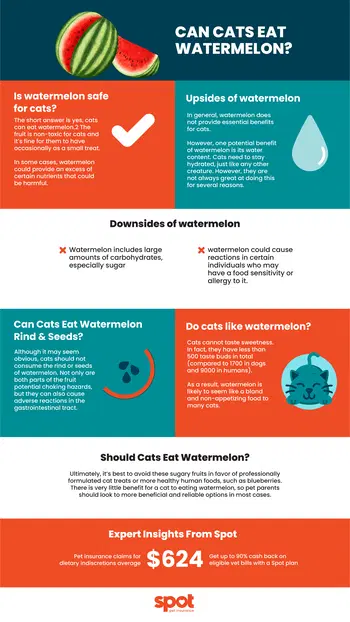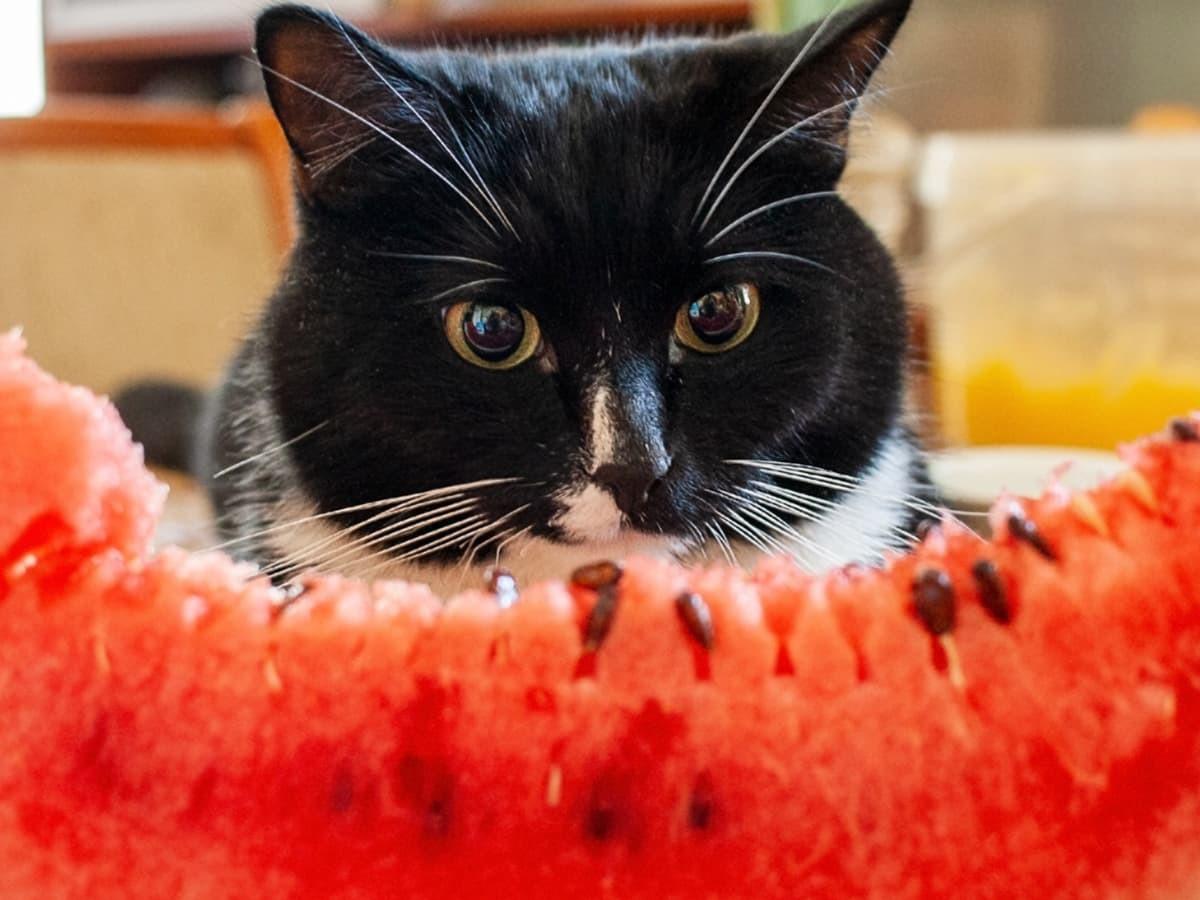Watermelon is one of those wonderful snacks that we crave on hot summer days. Unlike ice cream and lemonade, watermelon is significantly less unhealthy and can even carry some health benefits.
For cats, however, everything is a different story. As a separate species, cats have significantly different nutritional needs and digestive capabilities from humans and even from our domesticated dogs.
Cats require a finely balanced diet, which can be easily disturbed. As pet parents, it’s our responsibility to look out for our cat’s health from top to bottom. Not only should we ensure they receive a balanced core diet, but we should also make sure any treats we give them are safe and healthy.
Today, Spot Pet Insurance is lending a helping hand in this effort. We’re taking a deep dive into watermelon and all your biggest pet parent questions about it.
Is watermelon a safe snack for cats? Is watermelon healthy for cats? How much watermelon can a cat eat? Read on for more!
Understanding Cat Nutrition
Before we talk about watermelon specifically, we should understand how cats work.
Cats are obligate carnivores.1 They rely on meat and meat products for their diet, not plants. There are certain nutrients in meat (or meat products, such as eggs), such as taurine, that cats simply can not create on their own or access through any plant-based foods.
Due to their specialized diet, cats do not need plant food to survive, and in most cases, plant food is not particularly beneficial to them. In some cases, it is even hard to digest or harmful.
Plant food (or any food that is not certified commercial cat food) can easily imbalance a cat’s delicate diet, so it’s essential to be careful about feeding new foods to your cat. You should always consult a trusted veterinarian before doing so.
Is Watermelon Safe For Cats?
Now that we understand the role plant food fills (or doesn’t fill) for cats, we can look more closely at watermelon in an appropriate context.
The short answer is yes, cats can eat watermelon.2 The fruit is non-toxic for cats and it’s fine for them to have occasionally as a small treat.When formulated by a qualified professional, cat food provides everything your cat needs. Therefore, watermelon can only be seen as a treat.
Treats are just that — an occasional treat to satisfy a want, not a need. Choosing treats with positive nutritional qualities won’t hurt your cat, but it is not necessary for their health.
In some cases, watermelon could provide an excess of certain nutrients that could be harmful. For cats with pre-existing conditions, it could be even more dangerous.
Downsides of Watermelon
Watermelon isn’t a food that cats have eaten historically since they are carnivores at their core. As such, it’s no surprise there are some potential downsides when a cat eats watermelon.
Let’s talk about the main downsides in detail below.
Watermelon includes large amounts of carbohydrates, especially sugar
Watermelon is high in carbohydrates. There is some debate about whether carbohydrates are unhealthy for cats in general.
There are different kinds of carbohydrates. Simple carbs (sugar), dietary fiber, and starches are some of the most common, as are carbs from grains. Cats typically have a hard time digesting simple sugars and starch, which can lead to gastrointestinal upset. Whole grain carbs and properly processed starches, however, should pose no issue for a healthy cat.
Even though cats can process some carbs, they aren’t necessary for a cat’s diet. Cats can use protein instead of carbs to synthesize the glucose they need to keep their blood healthy. Recent science also suggests cats can adapt to use carbs efficiently in this way, instead of protein, when necessary. It is not, however, natural to them.
The main threat attributed to carbs is that they could cause obesity or diabetes. However, research suggests this is not the case. Carbs may not cause obesity or diabetes, but they are certainly not safe for cats who already have these conditions.
For that reason, you should never give watermelon to diabetic cats or cats with similar health conditions. The carbohydrate content, particularly sugar, in watermelon could be dangerous for their health.
Even for healthy cats, it is best to avoid high-carb foods since cat food already covers their glucose production needs, and excess carbs could be harmful.
Watermelon sensitivities & allergies
Every cat is different, and some cats react differently to watermelon than others. While it is generally safe for cats, watermelon could cause reactions in certain individuals who may have a food sensitivity or allergy to watermelon.
Always consult a trusted veterinarian before giving a new food, including watermelon, to your cat in any amount. Once you give your cat a new food, watch closely for any signs or symptoms of an adverse reaction. To avoid confusion in this area, it’s best to only introduce one new food at a time.
Can cats eat watermelon rind & seeds?
Although it may seem obvious, cats should not consume the rind or seeds of watermelon. Not only are both parts of the fruit potential choking hazards, but they can also cause adverse reactions in the gastrointestinal tract.
If you do feed your cat watermelon, it must be in bite-sized, seedless pieces, without the rind.
Upsides of Watermelon
While some fruits, such as blueberries, can be moderately beneficial to cats in terms of nutrition, watermelon doesn’t quite have the same quality. In general, watermelon does not provide essential benefits for cats.
However, one potential benefit of watermelon is its water content. Cats need to stay hydrated, just like any other creature. However, they are not always great at doing this for several reasons.
Sometimes you need a tasty incentive to get your cat the water they need. They may not want to stroll over to their water bowl and take the time to drink, but munching on a juicy watermelon could be a different story.
Unfortunately, since watermelon should only be fed in very limited quantities, a bite or two won’t be enough to satisfy all your cat’s hydration needs.
Do Cats Like Watermelon?
Cats cannot taste sweetness. In fact, they have less than 500 taste buds in total (compared to 1700 in dogs and 9000 in humans).3 As a result, watermelon is likely to seem like a bland and non-appetizing food to many cats.
In general, cats are quite picky regarding what food they eat. If you do have a cat who is desperate to eat watermelon, it’s not completely off the table, as long as you follow the tips in this guide and consult a veterinary professional first.

Expert Insights From Spot
While sharing our favorite foods with our pets can be tempting, it's important to remember that not all human foods are safe for cats. Spot's internal data shows that pet insurance claims for dietary indiscretions average $642*, highlighting the importance of caution and research before sharing snacks with your pets.
Conclusion: Should cats eat watermelon?
If you find yourself sitting on the porch eating watermelon next to your cat on a hot day, and you’ve consulted your vet, it may be okay to give them a small, bite-sized piece without seeds. It is also essential your cat does not eat watermelon rind.
Ultimately, it’s best to avoid these sugary fruits in favor of professionally formulated cat treats or more healthy human foods, such as blueberries. There is very little benefit for a cat to eating watermelon, so pet parents should look to more beneficial and reliable options in most cases.
At Spot Pet Insurance, we’re committed to being here for you through every step of your pet parent journey. Our Blog is full of helpful resources like this one. To see if a pet insurance plan provided by Spot Pet Insurance could also be a good fit for your fur family, get a quote today!

Mostly a tech person, always a pet person. I am dedicated to improving the lives of pets and their humans with technology. Off-duty, I enjoy writing about the misbehaving of computer programs and my two Aussiedoodles, Calvin and Hobbes.
*Jan 2019 to Aug 2024 administrator claims data.
Scott, Jim. “Why Your Cat Is an Obligate Carnivore.” RAWZ, 15 Aug. 2023, rawznaturalpetfood.com/obligate-carnivore-cats.
“Can Cats Eat Watermelon? Read before You Feed.” Purina, www.purina.co.uk/articles/cats/feeding/what-cats-eat/can-cats-eat-watermelon.
“Picky Pets: Does Yours Have a Discriminating Palate?" Taste of the Wild Pet Food, n.d., www.tasteofthewildpetfood.com/health/nutrition/picky-pets-does-your-have-a-discriminating-palate/.
The information presented in this article is for educational and informational purposes only and does not constitute or substitute for the advice of your veterinarian.












